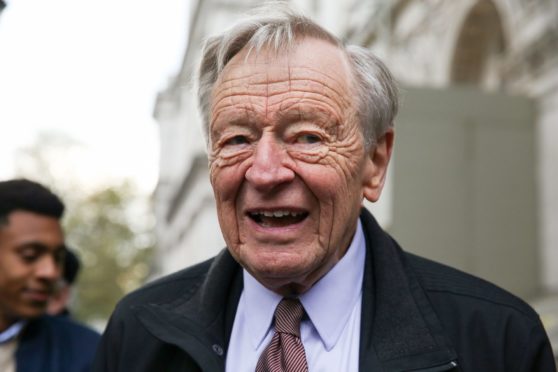
Labour peer Alf Dubs was just six years old in 1939 when, late one night, his mother took him to the train station in Prague and bundled him and a small suitcase on to a train bound for London.
The bare wooden seats lining the carriages of the Kindertransport were filled with children who, like Dubs, pressed their faces up against the windows of the departing trains, trying to get one last glimpse of fast disappearing parents. The words “see you soon” echoed down the platform, but most of the parents – who nearly all perished in the Holocaust – would never see their children again.
Hundreds of unaccompanied children were on those trains and for most it was the first time they had ever been away from home. Dubs sat quietly and upright for almost the entire journey – a small package of food left unopened on his knee.
At stops, German soldiers would board and march up and down the carriages, stopping occasionally to kick open suitcases rake through the contents on the floor. Children sobbed silently, too afraid to make a noise.
As the train crossed the Dutch border, Dubs remembers the older children erupting into loud cheers. He didn’t know why, but later understood it was because they realised they were now safe from the Nazis.
Dubs himself, arrived in London’s Liverpool Street Station two days later, one of the few to be met by a parent. His father had fled to Britain a few months earlier in search of a safe refuge for Jews.
Now nearly 90, Lord Dubs describes his flight to freedom with great humility, remembering all that were left behind and those who perished. “I was just a small boy who got on a train,” he tells me.
Dubs is a man who tries to see the good in anyone or any situation. But nothing, not even his attempts at minimising what he, as a tiny boy, must have gone through, can disguise the horrific backdrop to his early life and how it shaped who he became – a campaigning Labour politician and chair of the Refugee Council, who later poured his energies into being a member of the House of Lords and trying to ensure that vulnerable children fleeing danger would always find a sanctuary in Britain.
I last met Dubs in 2017 on the day the Lords approved the bill to trigger Article 50 allowing for the process to begin for the UK to exit the European Union. For a man whose own story of survival is woven into the fabric of Europe, he was pained by what Brexit would mean for refugees who could become easy prey for criminals and people traffickers.
Three years on, his fears have been realised when last week Tory MPs – bar six honourable dissenters – voted down his amendment to a bill that would have enshrined legal protection currently given under EU legislation to unaccompanied children of refugees seeking to be reunited with family in the UK.
Dubs said the vote would be a test of the humanitarian principles of MPs. They failed. There may no longer be an explicit commitment by this government to a hostile environment in its approach to immigration but for those abandoned children, stateless and without family, Brexit Britain must appear a cold and hostile place. And to Dubs, a spectre of the past.

Enjoy the convenience of having The Sunday Post delivered as a digital ePaper straight to your smartphone, tablet or computer.
Subscribe for only £5.49 a month and enjoy all the benefits of the printed paper as a digital replica.
Subscribe